Remembering November 22, 1963, the day JFK was assassinated
Sixty-one years later, it is still a vivid, shocking memory for almost anyone who was a child at the time.
On this 61st anniversary of President Kennedy’s assassination, I am reposting below a story I wrote about it in 2021.
JFK in Dallas, November 22, 1963, photo credit: Tommy Japan 79
On November 22, 1963, Frank Giglio, 17, was in his room at home in Queens, New York. He was reading To Kill A Mockingbird. His mother was in the kitchen. The radio was playing.
Mike Cerre, a high school sophomore in a Detroit suburb, was also home. He was cleaning the family's car and getting ready to pack it for the trip to Ann Arbor for the big football game the next day, Michigan vs. Ohio State.
In the Bronx, a little 4-year-old girl named Camille Moses was at home with her mom and 5-year-old brother. The television was on in the background.
Jerry Warshaw, just out of the U.S. Army, and visiting his mom in Queens. She had asked him to go to the butcher shop to buy some meat, so he was on his way in his car.
Rob Carmona, a 7th grader, was in gym class in New York.
In Istanbul, Turkey, where it was evening, 12-year-old Resit Ergener was at the movies with his parents.
Frank Williams attended public school in Canton, Mississippi and that's where he was, with his sixth grade class, finishing lunch that early afternoon. Like all public schools in Mississippi, his was segregated. It was all Black.
I was 10 years old, in my sixth grade class at the Buckley School in the San Fernando Valley. It was lunchtime. I was eating whatever it was my mom had packed in my lunchbox that day. Probably a sandwich and fruit. Our teacher, Mrs. Wyatt, left the room, which was a little odd but not alarming.
When she returned, she went to the front of class and got our attention.
"President Kennedy has been shot in Dallas," she said. "But he's going to be okay."
She said three suspects -- two men and a woman, or maybe it was two women and a man -- had been arrested. She was calm, as I recall it, but memory, of course, is often a lie. I wasn't sure what to make of it. Someone tried to shoot the president? Or someone had shot and wounded him? I wasn't sure which, but this was relatively good news because he wasn't in danger and the people responsible were in custody.
I don't recall how long we were left with this consoling fantasy. Mrs. Wyatt left again, or maybe someone came in and spoke to her. Whichever it was, she had more news. The president was not okay. He was dead.
I couldn't understand it, not at 10. People died, pretended to, in the movies and on TV. But this was no movie or TV show. And it was the president. I liked or maybe just had a good feeling about President Kennedy. In 1961, I had watched his inauguration on a black-and-white television wheeled into my 3rd grade classroom at 39th Street School. It was snowing. He wore a top hat. Since then, I had seen glimpses of him on the news. He seemed smart, confident, cool. He was the president of the United States with all the power and authority and stature -- and, in those days, respect -- that that carries. And now he was gone? Just like that?
That morning, there had been order. You didn't have to think about it. It just was. Now, suddenly, everything had fallen apart. I was scared.
On Facebook a few days ago, I asked people who remembered the Kennedy assassination for their recollections, where they were, what they recall. Hundreds responded. Almost everyone had been a child on November 22, 1963. Some had been as young as 3 but even they remembered the moment, the mood, the bursting emotions around them.
I heard from no one older than their early 20s at the time, and, of course, that made sense. Most people much older than that are no longer alive (and, if they are, aren't on Facebook). It's impossible for me to know how those who were adults at the time experienced it. But for those of us who were children, it was overwhelming, even traumatizing, not least of all because of how we saw adults, teachers, strangers, our own parents, reacted. Again and again, I read searing recollections of seeing teachers, adults, a mother or father or both distraught. The world turned upside down. In this new world, no one was safe.
Sent home from school early, third-grader Francine Scuderi of New York had started walking home with friends.
"I saw my Mom walking from the train station and she was sobbing," she said. "I had never seen my mother cry so much and I could not help her."
"Grown men and women were openly crying and grieving," said Vicki Gollmer, then a 6th grader in Canton, Georgia.
Jacki Watkins, 5 years old in November 1963, wrote, "I remember being very scared because all of the teachers were crying. When my mom came to pick me up, she was crying. My dad even came home from work and he was sad and upset. He was my rock. So that's when I knew this was something very serious."
In Michigan, Mike Cerre heard the news over the radio playing in the car that he was getting ready for the trip to Ann Arbor. His father, who worked so hard he rarely made it home in time for family dinner, arrived soon afterward.
"It was early in the day and my father came home," he said. "My father was not one to come home early. Life stopped."
Jerry Warshaw had just finished that shopping trip for his mom to buy meat. Mission accomplished, he was in his car about to head back to her home.
"I returned to my car with the meat order and noticed the butcher was running towards me on the street in his white apron shouting something incomprehensible," he said.
"I thought perhaps I short-changed him and owed him more money. But he was sobbing and I finally understood him to say 'They shot Kennedy! They shot Kennedy!' He was distraught, so I left my car and stayed for a few minutes until he stopped crying."
Nine-year-old Michelle Jacqueline Robinson was from New York City but at the time was living with her parents in Jamaica. It was a school day but she was home sick with tonsillitis.
"I was listening to the radio," she recalled. "The Voice of America broke into the broadcast. Even at 9-years-old, I knew something was terribly wrong. I thought World War Three had finally broken out. That's all we were terrified of back in the day. Next, my 9-year-old self was afraid my parents might be dead. The Voice of America announced that President Kennedy had been shot! Then we found out he had been killed! I could barely take it in. The entire island came to a screeching halt. People were crying in the streets."
In Istanbul, Resit and his parents came out of the movie theater to see newspaper vendors hawking special editions and shouting: 'Kennedy is shot!'"
"We bought one or several papers," he said. "We walked quietly to the town center, Taksim Square, along the Pera Street. I remember my father looking very upset and anxious. There was a general feeling of anxiety and the streets were quieter than usual. Turks loved Kennedy."
photo credit: RTD Photography
Kennedy's murder hit Catholics especially hard. He was one of them, a pioneer, an icon. But it was also a powerful blow to African-Americans. Kennedy had been hesitant about pushing a civil rights bill out of fear of crossing segregationist Southern Senators. The bill he had finally sent up to Congress earlier in 1963 was stalled in the House Rules Committee, going nowhere. But Kennedy was seen by Blacks as an ally, a man of good intentions, someone to be trusted. He had used or threatened to use federal troops to integrate the Universities of Mississippi and Alabama. There was a strong sense that this was someone who genuinely cared about us.
In that segregated classroom in Canton, Mississippi where Frank Williams and his classmates were eating lunch, his teacher broke the news.
"Sadness, sorrow and a spirit of why penetrated the class," Frank said. "Not only why? Who? How come? From our perspective, he was a good man, a good president and he seemed to like Black people. All the children in class laid our heads down on our desks, perplexed. We sat quietly thinking: what was the world coming to?"
For decades after, you could find in the homes of many Black Americans three photos on display. Jesus Christ,. Martin Luther King and John F. Kennedy.
After Mrs. Wyatt told us that JFK was dead, my friend, Michael Meyer and I were delegated - or maybe volunteered, I don't remember - to lower the school's flag to half-mast. Michael and I left the classroom, crossed the small asphalt playground and went to the flagpole. We must have spoken, but I just don't remember. I do remember us slowly, reverentially, delicately bringing down the American flag roughly halfway and re-tying the rope in the fixture. It felt like a sacred duty.
"My abiding, most vivid and meaningful memory of that sad and shocking day was going with you to lower the flag," Michael wrote to me in an email from London, where he's lived the last 40 years. "We both understood this was a somber and sad occasion."
Lee Harvey Oswald fatally shot by Jack Ruby, photo credit: e-strategyblog.com
Once I got home, my family and I watched the non-stop television coverage. On Sunday, incredibly, the man they said had killed Kennedy and a police officer, Lee Harvey Oswald, was himself gunned down in the custody of police. Millions of children saw it happen live.
"I was 12 years old," wrote Mary Ann Houston. "I still remember sitting straight up when I saw Jack Ruby shoot Oswald. As an only child, I absorbed everything and was traumatized for months after."
"I saw it live on television," Frank Giglio told me, "Ran to my parents who were outside and told them Oswald was shot. I got the feeling they didn't believe me. When I think of it, who would?"
That Sunday night, at home, changing channels, we -- it was I, my older brother, Keith, my mom and dad -- finally found a station that wasn't broadcasting JFK news. It was a Western movie. A cowboy was pointing a gun at someone, snarling: "I'll blow your brains out."
My dad shook his head. He said quietly, "This is a violent country."
My father's words would turn out to be prophetic. Two days later, Oswald would be gunned down on live TV. In the ensuing years, there would be more assassinations and attempted assassinations. Malcolm X. George Wallace. Robert Kennedy. Martin Luther King. There was even an attempt on Gerald Ford's life when was president. And in May 1970, four dead in Ohio. And as steady and relentless as a high tide, gun violence in America -- murders and mass murders -- would occur with increasing frequency. It has been 58 years since that grim November Friday. Two generations of Americans are alive today who have no personal memory of what happened. It's easy to overread significance in events that seem at the time epochal. I suppose it is just as easy to underestimate impact, too. Gaining historical perspective to fit events into a larger context necessarily takes time, often a lot of time. I'm not certain 58 years is enough time to know if Kennedy's assassination really was the pivot point in history that it seemed then, and still seems to me. The distance of time has surely changed how the Kennedy presidency is seen. It's not unreasonable to question now how good or great a president Kennedy was or would have been.
But maybe what happened on November 22, 1963 is bigger than the Kennedy presidency or the unknowable trajectory of history that was altered. Maybe what makes it so magnified, so important now, or at least to those of us who were alive then, is that it changed America. I can't escape the feeling that something was lost when Oswald - and I have come to believe Oswald did act alone - fired those three shots from his perch in the Texas Depository Building.
Cathy Booth Thomas was an 8th grader at a Catholic school in Dallas.
"To me, having a Catholic president seemed like a fairy tale," she said. "And that day my world seemed to fall apart. It was the end of my innocence."
Again and again, I heard variations of that.
Ellen Barth wrote, "My childlike optimism was forever changed."
"It was a moment one never forgets," said Bella English. "Same with 9/11 and I suspect January 6."The murky, suspicious circumstances of the killing -- one guy all by himself and that guy then gets shot by a strip club owner while in police custody? -- spawned countless conspiracy theories, a trend that continues to the present when the wildest, most preposterous such theories have become part of political discourse.
Lyndon Johnson sworn in as president, photo credit: James Vaughan
Some people trace the distrust of politicians and presidents to Johnson and Nixon. I think a case can be made that that cynicism (not unreasonable) began with Kennedy's death. Whether he earned it or not, arguably no president since has been so widely admired by Americans and foreigners.
And in account after account, those who remember that day talk about being glued to the television watching the news coverage for hours. That's not unusual now. But then there was far less news coverage, just a couple hours in the early evening. Many, if not most TV stations went off the air after midnight. With the Kennedy murder, television would be where Americans turn in times of tumult and crisis for information and reassurance.
In 1968, at Robert Kennedy's funeral, his brother, Ted, gave the eulogy."My brother need not be idealized or enlarged in death beyond what he was in life," Ted Kennedy said.**After he was killed, John F. Kennedy was idealized and enlarged beyond what he was in life, quickly becoming the mythic figure we remember today. That is the fate of the people we call heroes. It was unavoidable given the trauma and tragedy of November 22, 1963. Writing an article entitled Kennedy Without Tears in Esquire magazine that was published six months later, Tom Wicker lamented that the myth would eclipse the man.
"He soon will stand, perhaps in our lifetime -- cold stone, or heartless bronze, immortal as Jefferson, revered as Lincoln, bloodless as Washington," Wicker wrote. "What his country inevitably will do for John Kennedy seems a curious fate for the vitality and intensity, the wry and derisive style of the man who was the Thirty-Fifth President of the United States."
Only the myth endures.

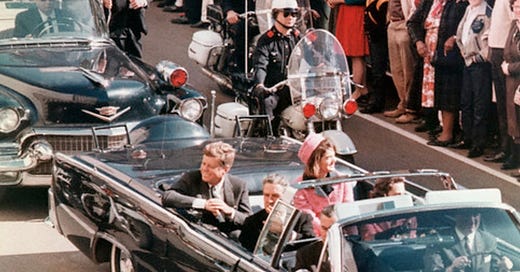



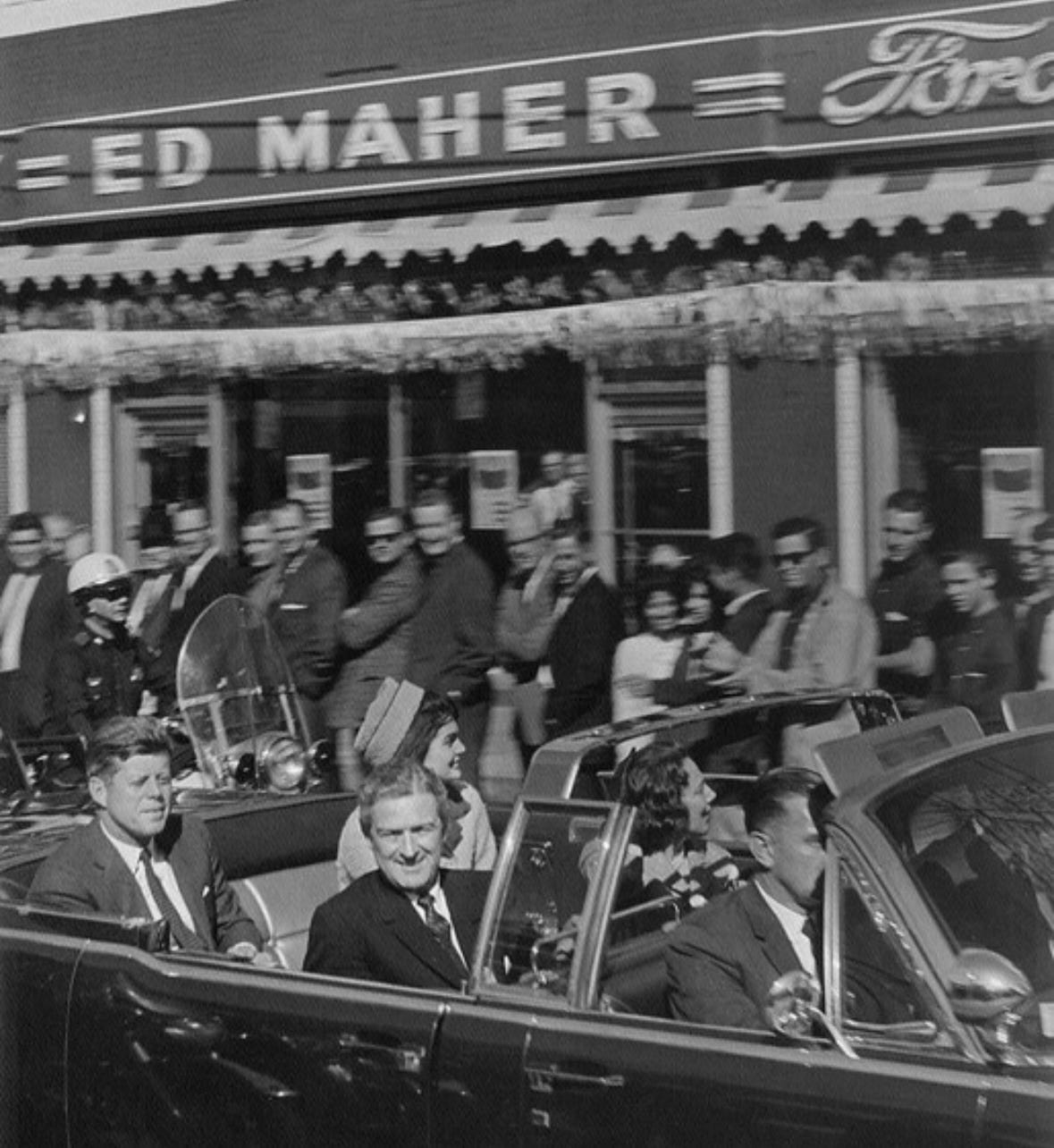
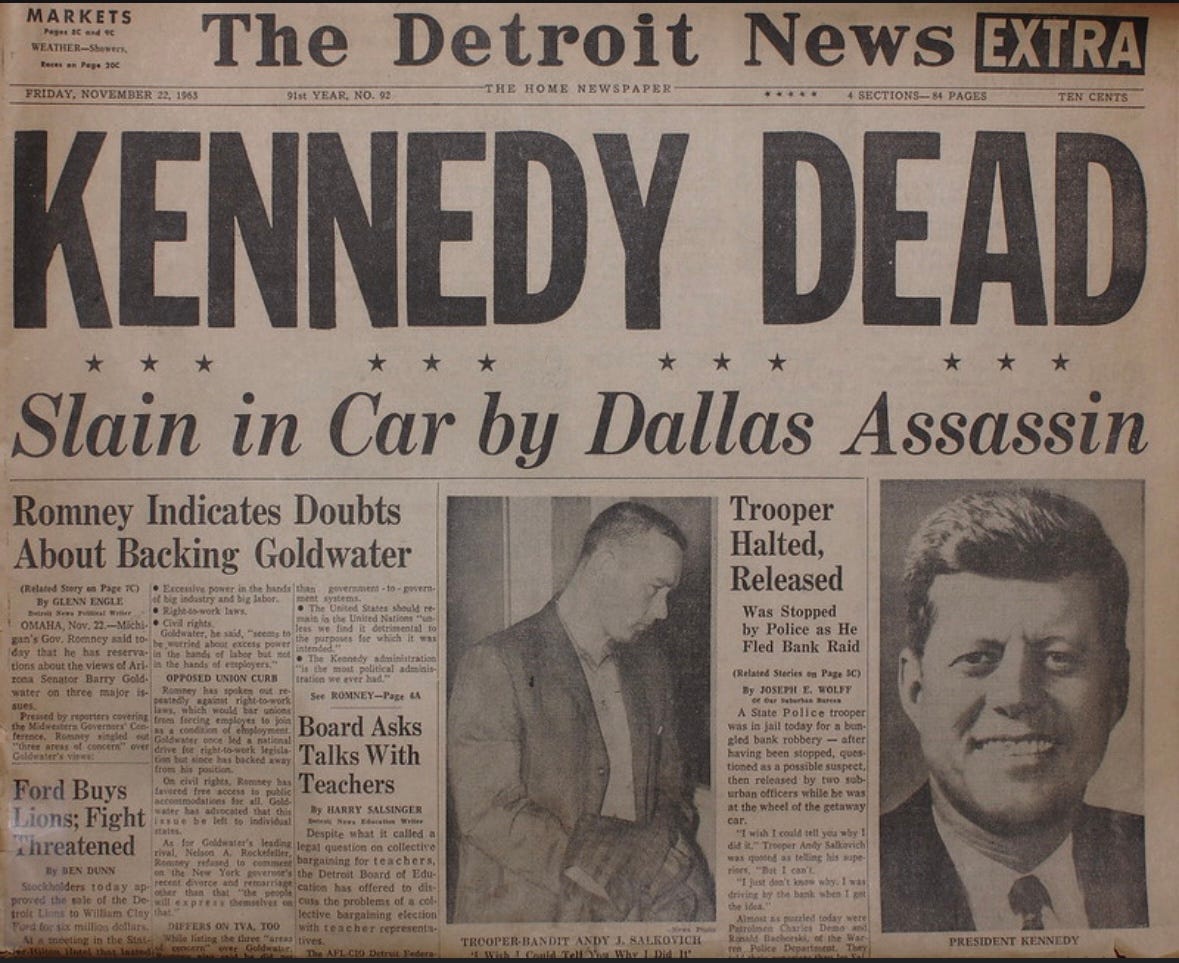
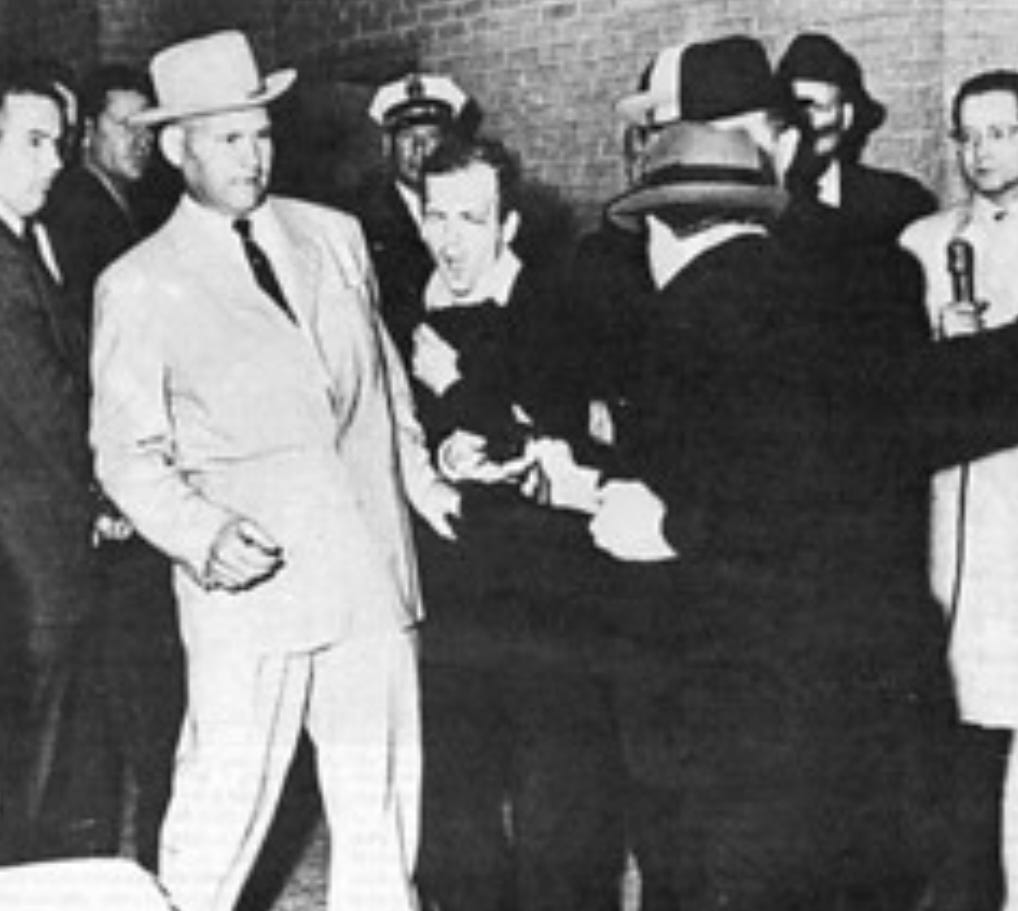
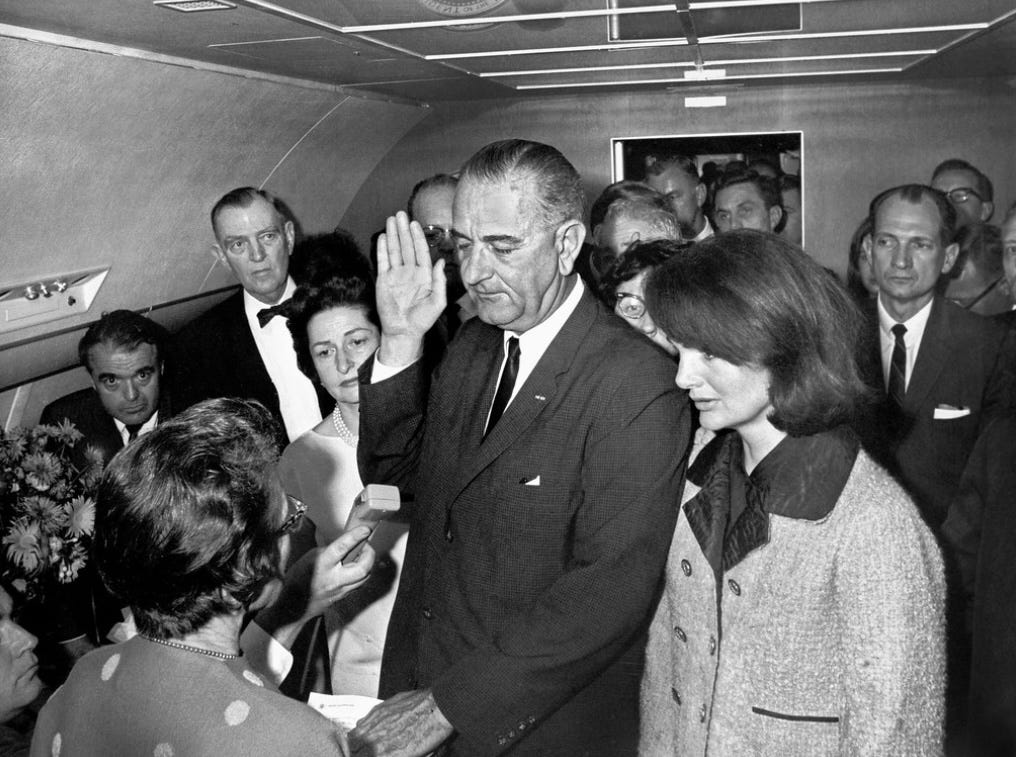
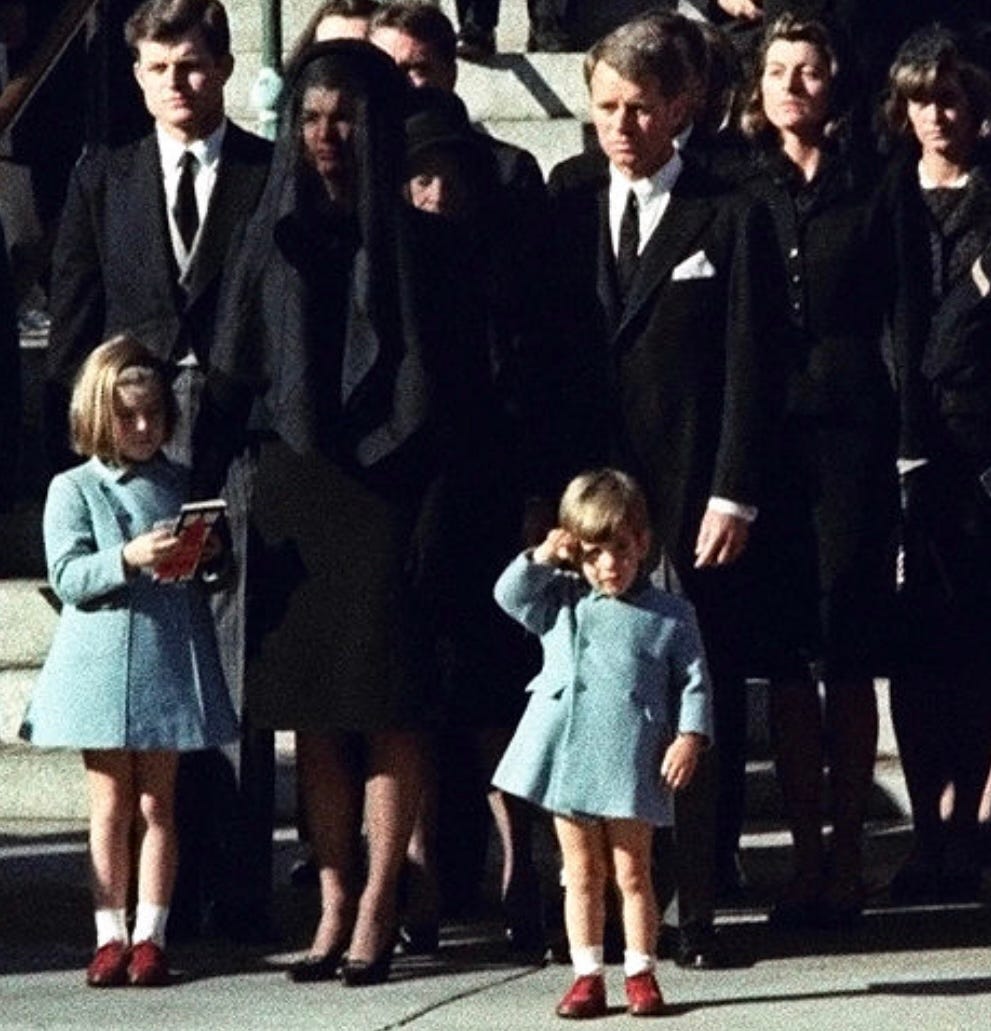
6th grade. Mostly I remember the aftermath. The shooting of Oswald. The funeral. The pictorials in the paper and magazines. The picture you posted is iconic. It was a very confusing time. The first of many assassinations. Why?????
2nd grade, Mrs. Gates said the president's been shot. I looked up at the portraits in front of the room & wondered, " Lincoln or Washington?"